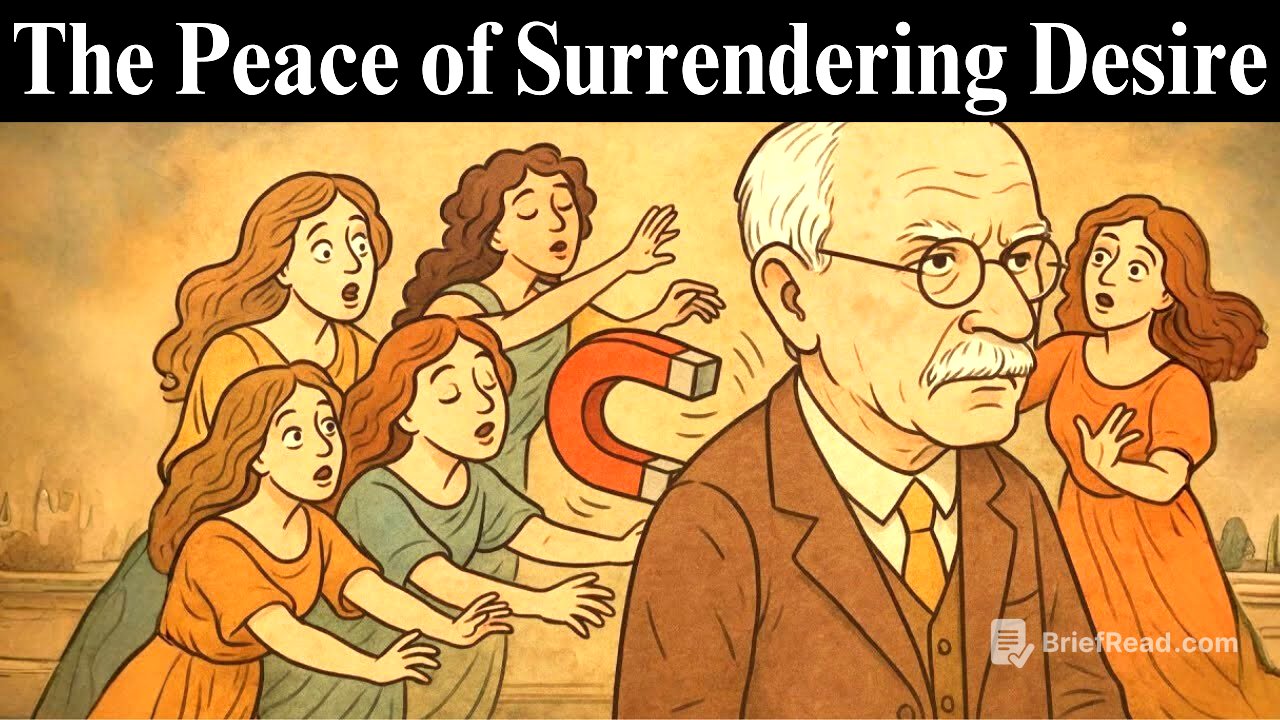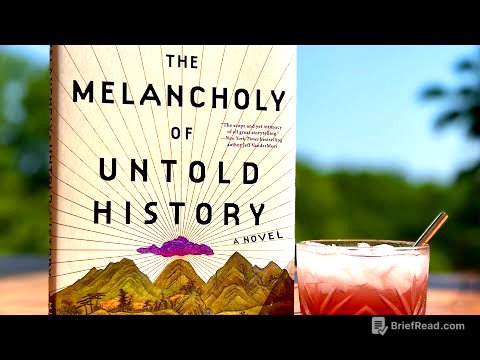TLDR;
This video explores the nature of suffering, the futility of endless striving, and the possibility of finding peace through acceptance and detachment. It suggests that life is a wound to be tended, not a puzzle to be solved, and that true wisdom lies in seeing the world as it is, without illusion. The video touches on themes of loneliness, the illusion of self, and the transient nature of all things, ultimately proposing that peace can be found in surrendering to the present moment and witnessing existence without resistance.
- Suffering is inherent to existence, not an aberration.
- The pursuit of desire is ultimately futile.
- True peace comes from acceptance and detachment.
- The self is an illusion, a collection of transient experiences.
- Wisdom lies in seeing the world as it is, without hope or illusion.
The Nature of Existence [0:05]
The world reveals itself in the silence before dawn, unmasking truth and indifference to hope. Suffering is a central drama of life, prompting souls to listen in the darkness. Existence is portrayed not as a puzzle but as a wound, characterized by lack, longing, and ache. Desire drives an endless pursuit, where even pleasure is a temporary pause from pain. Time erodes youth, beauty, and love, while the world's rewards are fleeting. Happiness remains elusive, a mirage created by the thirst for becoming, and progress is confined within a cage of possessions.
The Futility of Modern Pursuits [2:16]
Modern society, with its promises of fulfillment through the market and technology, ultimately fails to satisfy the soul's deep needs. The pursuit of more leads to emptiness, as no commodity can fill the inner abyss. Humans are portrayed as creatures of want, driven by an insatiable will that consumes everything. Relationships are rooted in longing and need, and even love cannot abolish the solitude within each heart. Art, religion, and philosophy are attempts to find meaning in the void, but meaning remains as fleeting as pleasure.
Acceptance and Understanding [4:50]
Wisdom is found in seeing the world as it is, leading to clarity through sorrow. Surrender brings a strange peace, accepting the rigged nature of existence. Civilizations build monuments to hope, but history reduces all dreams to dust. Collective loneliness pervades city life, with distractions failing to banish the underlying dread. Recognizing that life owes nothing and that suffering is not punishment leads to a deeper sobriety. Resting in the quiet emptiness at the center of being allows one to see inevitability rather than tragedy in the decay of all things.
The Illusion of Self and the Acceptance of Transience [8:08]
Living in acceptance of transience, one understands that every joy is fleeting and every sorrow passes. The mind is a stage for countless dramas, and the self is merely a bundle of impressions. Personality is a mask for survival, concealing emptiness. Validation from others is a fleeting narcotic, unable to quiet the existential silence. Acknowledging the ache of existence is an act of honesty, recognizing suffering as the rule, not the exception. Despair, faced unflinchingly, becomes a mirror reflecting truth, leading to acceptance and freedom from self-justification.
The Indifference of the Universe and the Decay of the Body [10:37]
The world continues indifferently, unaffected by human longing. Modernity's promises of deliverance from suffering are hollow, with technology amplifying loneliness and politics redistributing disappointment. The body becomes a record of time's passage, decaying and fading. Amidst the ruins of certainty, the soul learns to dwell with emptiness, finding patience and gentleness. Suffering becomes a familiar companion, the price of consciousness, necessary for depth and wisdom.
The Nature of Suffering and the Role of Art [12:57]
All things strive to persist but ultimately fail. Religion, philosophy, and art are testimonies to the human refusal to accept silence, witnessing the soul's confrontation with the void. The will to live is the will to suffer, with every attachment bringing pain. Modernity accelerates desire, but the human heart remains unchanged, still asking why we must suffer. Seeing the world without hope is seeing it as it is, leading to a quiet, unadorned peace found in ceasing the frantic search for escape.
Living Without Hope and the Stillness of the Mind [16:02]
Living without hope means living without illusion, witnessing loss without protest. The soul, stripped of defenses, finds itself unburdened, experiencing lightness in sorrow and freedom in despair. Returning to the present, one finds nothing promised and nothing required. The world is indifferent to awakening or ignorance, and the soul is the awareness that remains when all else is taken away. In the silence of night, one discovers the comfort of nothingness, a peace that does not depend on hope or purpose.
The Unyielding Clarity of What Is [18:06]
Each morning unveils the world's old wounds, with sorrow waiting patiently. Pain is a condition woven into the fabric of being, and every pleasure reveals the outline of its opposite. The heart aches because it cannot remain full, and hope becomes transparent, its promises disguising future disappointment. The mind weaves consolations, but the body remembers the deeper truth: there is no safety from time or necessity. The will is a silent tyrant, commanding endless striving for what can never be possessed.
The Search for Questions and the Cooling of the Spirit [20:11]
In moments of clarity, the self seems like a house built on shifting sand, with memories flickering and identities mutating. Illusion constructs the world with gentle deceit, but as each curtain is drawn aside, the same blank expanse appears. The search for answers becomes a search for questions worth asking, and certainty is replaced by resignation. Detachment arrives as a consequence of honesty, the slow cooling of the spirit and the withdrawal of hope's fever.
Detachment and the Acceptance of Loss [21:40]
Learning to release and let the world pass through like water, one is less torn by what cannot be kept. Witnessing suffering without resistance initiates a deeper solitude. Compassion is a quiet presence, acknowledging the wound that binds all life. Death reveals itself as an intimate companion, shaping every moment. In the abandonment of hope, the world becomes luminous, and suffering stands revealed. The mind, untethered from hope, learns to sit with the ache, finding stillness beyond longing.
The Witness, Not the Actor [23:49]
Detachment is not withdrawal from life but acceptance of its passing nature. One becomes the witness, not the actor, observing desire and loss. Existence is sufficient precisely because it cannot be otherwise. The soul, unburdened by hope, dissolves into the peace of simply being. In the slow hours, the truth of suffering emerges, and sorrow is seen as the thread on which all experiences are strung.
The Impotence of Will and the Theater of Perpetual Change [25:18]
The ancient hunger underlies all striving, a hope for completion that can never be fulfilled. Illusions multiply to meet the demand for meaning, but no doctrine can silence the pulse of lack at the core of being. Confronting suffering without disguise reveals the impotence of will. Detachment deepens as a result of broken faith in the power of desire. The world recedes, seen as a theater of perpetual change, and the passions grow quiet.
The Tragic Grandeur of Existence [27:28]
Even love is unmasked as a shadow of need, doubling the exposure to suffering. The wise heart loves gently, holding nothing too tightly. The world, stripped of disguises, stands in its tragic grandeur, with no malice in its indifference. Living in this knowledge means carrying sorrow with grace, ceasing to demand justice from the world. Suffering is not the enemy but the proof that one is awake.
The Solace of Cessation [29:30]
There is nobility in persistence and strength in refusing to invent comfort. Freedom is found in no longer identifying with the will's fever. The self is a passing phenomenon, and the world continues unmoved by private sorrow. The soul survives as awareness, unburdened by hope and untouched by regret. There is solace in cessation, with the fire of longing cooling and the soul finding rest in accepting what cannot be changed.
The Journey's End: Surrender and Dissolution [31:37]
The journey ends in surrender, with peace blooming where hope once struggled. The heart lets fall the burden of expectation, and the air is filled with the hush of surrender. Memory dissolves, and regret loses its teeth. The wound of existence remains open but ceases to demand healing. What once mattered dissolves, and the self is seen as a passing ripple. All is borrowed, returned, lost, and forgotten.
The Final Hush: Beyond Sorrow and Peace [33:21]
Suffering becomes a kind of music, and grief, unresisted, turns transparent, revealing a peace that was always present. To let go is to awaken from the dream of choice. The will grows faint, and there is no longer anyone to save. The world persists, but the self has left the stage. In this final hush, the distinction between sorrow and peace disappears. Suffering is not ended, but it no longer defines. The eyes close without protest, and the will vanishes. There is no lesson, no judgment, no promise, only the relief of nothing more to lose. The soul drifts out beyond longing, and suffering and desire dissolve into stillness.









